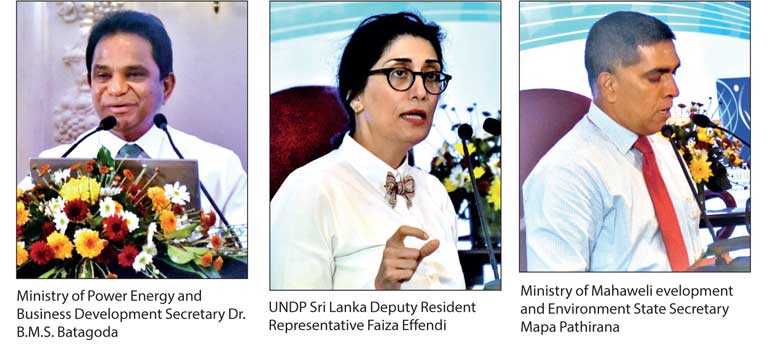Tuesday Feb 24, 2026
Tuesday Feb 24, 2026
Friday, 15 November 2019 00:00 - - {{hitsCtrl.values.hits}}

Climate change, coupled with global warming, has dramatic repercussions on almost every sector. Melting ice caps, the rise of global sea levels at an unprecedented rate of 3.2 millimetres a year, along with the rise in temperatures are affecting biodiversity, species and habitats everywhere.
With the enforcement of the CoP 21 Paris Agreement on climate change, the country is entering a new decade governed by this framework on climate action. Being one of its signatories, Sri Lanka is obliged to deliver its climate change commitments through Nationally Determined Contributions (NDCs).
Sri Lanka’s energy sector has a 20% Greenhouse Gas (GHG) emission reduction target in the NDCs, which amounts to 40 million tonnes of the total GHG emissions within the next decade. Nationally Appropriate Mitigation Actions (NAMAs) refer to any action that reduces emissions in developing countries and is prepared under the umbrella of a national governmental initiative. They can be policies directed at transformational change within an economic sector, or actions across sectors for a broader national focus. NAMAs are supported and enabled by technology, financing and capacity-building, and are aimed at achieving a reduction in emissions relative to ‘business as usual’ emissions in 2020.
NAMAs were introduced in the international climate negotiations in 2017. According to the Bali Action Plan, the enhanced action on climate mitigation is to include ‘NAMAs by developing country parties in the context of sustainable development, supported and enabled by technology, financing and capacity building in a measurable, reportable and verifiable manner’. Following the Bali Action Plan, complementing provisions reached in proceeding climate summits moulded the concept of NAMA into the mitigation instrument we know today.
The main objectives of the NAMA are two-fold; to contribute to national sustainable development and reduce GHG emissions as a developing country’s net contribution to the global mitigation effort to stay below 2 0C of warming.
The first NAMAs in Sri Lanka are being implemented with the energy generation and end use sectors by the Sri Lanka Sustainable Energy Authority under the leadership of the Ministry of Power, Energy and Business Development, and the Climate Change Secretariat in Sri Lanka under the Ministry of Mahaweli Development and Environment in collaboration with the United Nations Development Programme, Sri Lanka. The $1.79 million project with the financial assistance of the Global Environment Facility (GEF) supports appropriate climate change mitigation actions in the energy sector.
Building on the lessons learnt throughout the project period, a knowledge-sharing session on the theme of ‘Leading the Battle Against Climate Change: The Energy Sector Response’ was held recently in Colombo, Sri Lanka with the participation of over 75 officials from the public and private sector along with academia from the energy sector.
Sharing the keynote address at the inaugural session, Ministry of Power, Energy and Business Development Secretary Dr. B.M.S Batagoda stated, “As the Government, we can’t fight this battle against climate change alone. We need to work together. Forums such as this create a knowledge base which also helps in monitoring, verification and reporting on Sri Lanka’s energy targets that need to be achieved.”
All energy users, especially industries and commercial entities are expected to reduce their emissions with a focus on reducing the use of fossil fuels. Investments in renewable energy development and energy efficiency improvement whilst helping the battle against climate change can improve the productivity and profitability of these industries and commercial establishments, he said.
UNDP Sri Lanka Deputy Resident Representative Faiza Effendi speaking at the session also highlighted UNDP’s role in the project, “UNDP remains committed to support Sri Lanka in achieving its renewable energy commitments through four main areas: Building capacity and leveraging technical assistance to help countries access finance for climate and development goals, connecting key stakeholders, sensitising leaders from the public and private sector to build collective ambition, and mobilising thought leaders, decision-makers, financial institutions and the business community with the goal to drive action, raise ambition and mobilise investments.”
The informative sessions illustrated and discussed specific areas of the project intervention, including energy sector data management, Monitor, Report and Verify (MRV) and Marginal Abatement Cost (MAC) analysis, and a pilot demonstration. Further, technologies on Variable Frequency Drives (VFDs) in the tea sector, domestic solar Photovoltaic (PV) with battery energy storage and bio gas programs, were also presented during the forum.
Ministry of Mahaweli Development and Environment State Secretary Mapa Pathirana stated, “Sri Lanka has been ranked the second-highest country to be affected by extreme weather. It is time for Sri Lanka to make a challenging effort to reduce its dependency on fossil fuels. Each of us are responsible for our carbon footprint. We need to create a revolution in the energy sector and cut down on Greenhouse Gases (GHGs) through appropriate mitigation actions.”
Through the project, further measures are being taken to achieve the target of reducing 6,000 tonnes of Carbon dioxide emissions per year and approximately 9,000 Gigajoules energy savings annually.
(UNDP partners with people at all levels of society to help build nations that can withstand crisis, and drive and sustain the kind of growth that improves the quality of life for everyone. On the ground in 170 countries and territories, we offer global perspective and local insight to help empower lives and build resilient nations. www.lk.undp.org.)